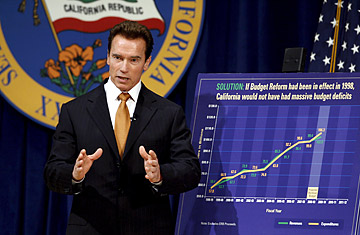
California governor Arnold Schwarzenegger
When Governor Arnold Schwarzenegger announced that California might have to go to the Federal Government for a $7 billion loan to fund its daily operations, it was the most dramatic display yet of how state and local governments are being buffeted by the deterioration in credit markets. With few willing buyers of municipal securities, Massachusetts twice shelved plans to float $750 million worth of short-term notes used for paying its bills. And across the country, dozens of other funding deals for longer-term projects, from road repair to school expansion, have been delayed.
Since the Sept. 15 collapse of Lehman Brothers, the $2.6 trillion market for state and city bonds has been virtually frozen — partly because investors are scared to own anything more dangerous than Treasuries, and partly because interest rates that cities must pay to lure buyers have shot up 25% or more. As a result, some $15 billion worth of projects have been temporarily shelved in the past three weeks, according to the consultancy Municipal Market Advisors. Broward County, Fla., pushed back plans to borrow $170 million for new sewer and water lines. Maine held off on a $50 million bond sale meant to finance 10 highway construction projects. The airport authority in Washington, D.C., delayed a $175 million issue intended to finance the expansion of terminals.
But don't expect states to follow California's lead and start queuing up in Washington looking for money simply to be able to pay their teachers and firefighters. While all states have to deal with an uneven influx of revenue from tax collection, California is among the very few that deal with temporary shortfalls by issuing short-term debt. Most states instead rely on internal cash management — in some cases, borrowing from their own pension funds if necessary — which means they aren't dependent on outside borrowing in order to make payroll and keep the lights on. And even those municipalities that do use short-term notes may succeed in selling them in the end. On Oct. 8, Massachusetts finally sold its $750 million worth after hiring Goldman Sachs and Citigroup to find buyers, instead of running a normal auction. California is going to try to sell $4 billion worth of securities next week.
There are also promising signs that the broader market for municipal bonds is starting to thaw. On Oct. 7, Kentucky sold $400 million worth of bonds to finance education and public works projects around the state. It was one of the first major issues since the Federal Government started taking one unprecedented step after another to try to jolt lending back to life — cutting interest rates, starting a program to buy short-term corporate debt, authorizing hundreds of billions of dollars to get toxic mortgage-related assets off bank balance sheets and inject capital into the companies. "We were really worried," says Jonathan Miller, the state's secretary for finance and administration. "We had encountered a lot of pessimism and skepticism that we'd be able to sell these bonds." Bolstered by how the Kentucky issue went, Ohio followed with a $240 million offering of its own that afternoon. "While the floodgates won't necessarily open, things aren't quite as dire as people have thought," says Scott Pattison, executive director of the National Association of State Budget Officers.
But both Ohio and Kentucky — and the Long Island Power Authority in New York, which also sold bonds that day — paid much more of a premium over Treasuries than they would have before the credit crunch began in the summer of 2007, says Matt Fabian, managing director at Municipal Market Advisors. Ohio, for instance, is paying almost 1 percentage point more in yield for 20-year bonds than it did a year ago. "Maybe this is the new normal," says Fabian.
And even if the credit markets do return to some semblance of normalcy, there is still the larger issue: for states and cities, as with the rest of America, the credit crisis has tumbled into the real economy. Before the long-simmering credit crunch kicked into high gear in mid-September, municipalities were already facing strong headwinds. In a survey of 319 city finance officers conducted from April to June, the National League of Cities found that 64% of respondents said their cities were less able to meet fiscal needs than in 2007. Cities get 28% of their funding from property taxes, which the finance officers surveyed expected to be down 3.6% this year, thanks to falling home values. Two other important sources of tax revenue for many municipalities — sales tax and income tax — were also expected to drop, by 4.2% and 3.3%, respectively.
Now things look even worse. Arizona is projecting a billion-dollar budget shortfall, as is California. New Jersey is falling $1.7 billion short, while New York is $1.2 billion behind. Among the cities that have already announced spending and job cuts are Indianapolis, Tempe, Ariz., Columbus, Ohio, and New York City. "The economy has changed rather dramatically," says Christopher Hoene, director of research at the National League of Cities. "We're going to be facing this for the next two or three years."
Which means, if you ever use a state or city service — elementary schools, public libraries, police or fire departments — you will be facing it too.
